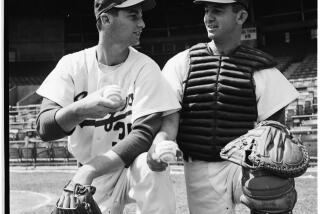Roger Sperry; Won Nobel for Split-Brain Research
- Share via
Roger W. Sperry, a retired Caltech professor of psychobiology who shared the Nobel Prize in medicine and physiology for his split-brain research establishing the separate functions of the “left brain” and “right brain,” has died. He was 80.
The scientist, who taught at Caltech from 1954 until his retirement in 1984, died Sunday in Pasadena, Caltech officials announced Monday.
Sperry received half of the 1981 prize for his studies of brain function over 40 years. The Nobel academy praised his work in the three major areas of developmental neurobiology, experimental psychobiology and human split-brain studies.
The balance of the prize was shared that year by Harvard scientists David H. Hubel and Torsten N. Wiesel for their research in brain processing of information from the eyes--based on Sperry’s earlier vision research.
Known as a quiet, solitary researcher who preferred privacy, Sperry typically disappeared on a fishing trip with his wife at the time the prizes were announced. It was more than a week before his impatient colleagues could find him to celebrate the international honor. His longtime laboratory assistant, Lois MacBird, even suggested that the school dispatch planes along the Baja California coast to skywrite, “Hey, you won!”
First with animals and later humans, Sperry studied the consequences of severing a large cable of nerve fibers that connects the two hemispheres of the brain. That nerve cable, called the corpus callosum, is the principal channel of communication between the two hemispheres.
He found that each hemisphere had its own sensations, perceptions, feelings, ideas and memories. He also determined that each side of the brain had specialized functions--left for verbal, mathematical, analytic and logical functions, and right for spatial perception, seeing and recognizing objects, and nonverbal communication such as music.
Sperry’s research was considered fundamental not only for medicine and science but also for education and philosophy, and lent credence to the theory that genetic factors have a greater effect on behavior than environmental factors.
For his extensive work, Sperry also garnered the National Medal of Science presented by President George Bush in 1989, and both the Wolf Prize in Medicine and the Albert Lasker Medical Research Award in 1979. He was named California Scientist of the Year in 1972.
His other research included the functions of brain cells, the study of vision, the growth and development of neurons in the brain according to inherited chemical codes, and--in his later years--philosophy. The January, 1994, issue of “Humankind Advancing” was dedicated to Sperry for his philosophical theories of behavioral science that evolved from his study of consciousness in the surgically separated brain.
Sperry wrote many scientific articles about his work, and was the author of books such as “Science and Moral Priority,” published in 1983.
Born in Hartford, Conn., he earned a bachelor’s degree in English literature and a master’s degree in psychology from Oberlin College and a doctorate in zoology from the University of Chicago.
His World War II military service involved work at the federal government’s Medical Research Project on Nerve Injuries.
Sperry later taught anatomy, then psychology at the University of Chicago, and at the same time served as section chief for neurological diseases and blindness at the National Institutes of Health.
He moved to Caltech in 1954 as Hixon Professor of Psychobiology.
Sperry also was a prolific sculptor and an avid paleontologist, collecting prehistoric mollusks around the world.
Sperry is survived by his wife of 45 years, Norma Deupree Sperry of Pasadena; a son, Glenn Tad Sperry of Philadelphia; a daughter, Janeth Hope Sperry of Cleveland; a brother, Russell L. Sperry of Bend, Ore., and two grandchildren.
The family has asked that any memorial donations be made to the Muscular Dystrophy Assn. or to the Children’s Lung Fund in Cleveland.






